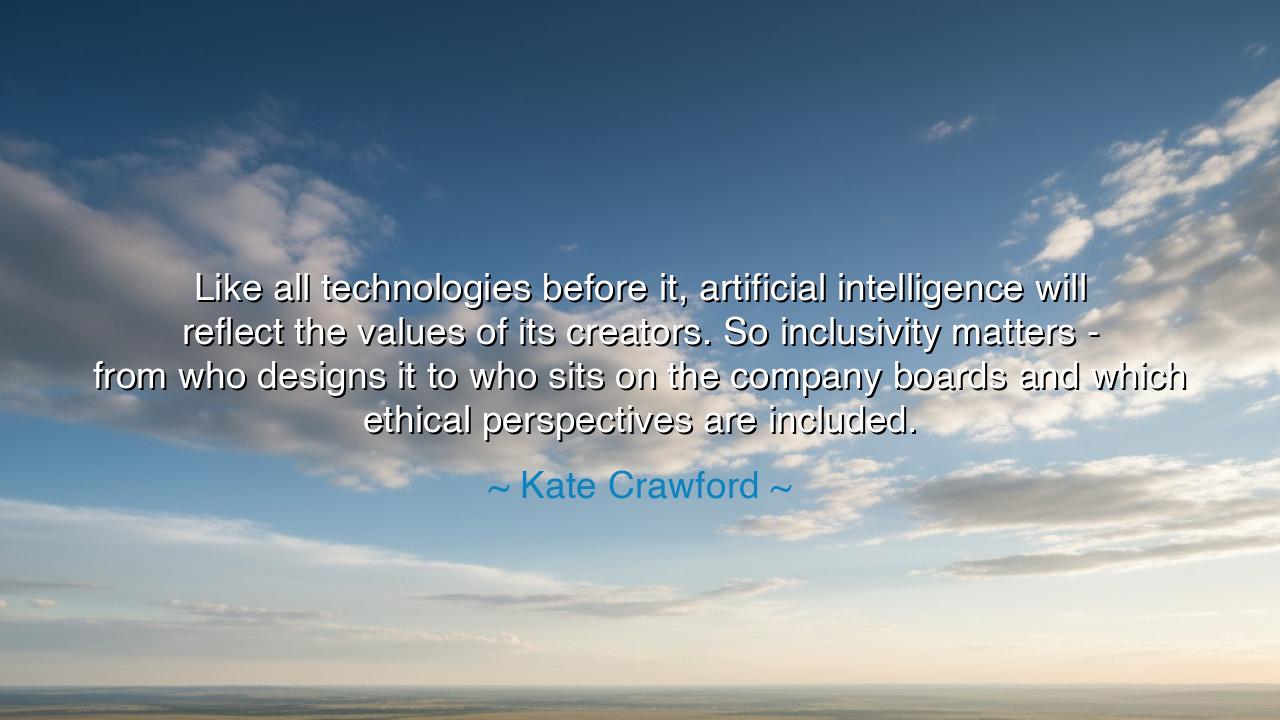
Like all technologies before it, artificial intelligence will
Like all technologies before it, artificial intelligence will reflect the values of its creators. So inclusivity matters - from who designs it to who sits on the company boards and which ethical perspectives are included.






In this profound and visionary declaration, Kate Crawford, a leading scholar in the field of artificial intelligence and ethics, speaks not merely of machines, but of humanity itself. She proclaims, “Like all technologies before it, artificial intelligence will reflect the values of its creators. So inclusivity matters — from who designs it to who sits on the company boards and which ethical perspectives are included.” These words are a beacon in the age of algorithms, reminding us that technology is never neutral, that behind every machine lies the mind — and heart — of its maker. Crawford, like a philosopher of the modern world, calls us to awareness: that our creations, however advanced, are mirrors of our collective soul.
The origin of this quote lies in Crawford’s long study of how technology intertwines with society, power, and inequality. As one of the foremost voices in AI ethics, she has spent years observing how the systems built to serve humanity can also perpetuate its biases. Her research has shown that the data used to train AI — drawn from human history — often carries the marks of prejudice, exclusion, and injustice. Thus, when she says AI will reflect the values of its creators, she speaks not of distant possibility but of an ongoing truth: that technology, like fire or steel, can build or destroy depending on the hands that wield it. In her wisdom, Crawford warns that to shape machines wisely, we must first examine the moral compass of those who build them.
From the dawn of civilization, every new technology — the plow, the printing press, the steam engine, the computer — has borne the signature of its age. The printing press, for example, spread enlightenment and tyranny alike; it birthed the Renaissance, but also the propaganda that fueled wars. The machine itself was innocent, but its purpose was decided by human intent. And so it is with artificial intelligence — a power as immense as any the world has ever seen. It has the potential to cure diseases, illuminate mysteries, and bridge worlds. Yet, in the wrong hands, it may divide societies, distort truth, and deepen inequality. Crawford’s message, therefore, is not simply about innovation, but about responsibility.
Her call for inclusivity resounds like the wisdom of an ancient oracle. For when only a few voices shape the tools that will govern the many, imbalance is born. Consider the example of Ada Lovelace, often called the world’s first computer programmer. In the 19th century, when women were barred from most scientific endeavors, she envisioned a machine that could do more than calculate — one that could think, imagine, and create. Had her voice been silenced, how much of that prophetic vision might the world have lost? Likewise, Crawford warns that if those designing artificial intelligence come from a narrow circle — one culture, one gender, one class — the technology they create will reflect their limits, not humanity’s potential.
To build inclusive technology is to build a future that belongs to all. This means inviting not only engineers but philosophers, artists, ethicists, and dreamers into the conversation. It means ensuring that those who have been marginalized — the poor, the oppressed, the unseen — are not merely subjects of data, but participants in its creation. For every algorithm carries a worldview, every dataset tells a story, and if those stories exclude the voices of the many, then the machine becomes a monument to inequality. In this, Crawford echoes the wisdom of the ancients: that the tools of civilization must serve justice, or they will serve power.
The truth she speaks is timeless: intelligence without ethics is chaos. Whether human or artificial, intellect divorced from morality breeds destruction. The builders of the future must therefore cultivate wisdom as much as skill, and compassion as much as calculation. For it is not enough to teach machines how to think — we must also teach ourselves how to feel rightly. The boardrooms that design the future must not only be diverse in face, but in conscience. The measure of progress is not in speed or scale, but in justice — in whether technology uplifts or diminishes the human spirit.
So, my child, let this teaching take root in your heart: the world you build will one day reflect you. Every code you write, every choice you make, every innovation you unleash carries your values into eternity. If you build with greed, your creations will corrupt; if you build with love and fairness, they will heal. Let inclusivity guide your work, and let humility temper your ambition. Seek out voices unlike your own, for wisdom is found not in echo, but in diversity.
For as Kate Crawford reminds us, the age of artificial intelligence is not a story of machines — it is the story of mankind once more looking into its own reflection. And if we wish to see a future worthy of our dreams, then we must ensure that the reflection staring back is one of justice, empathy, and shared humanity. Only then will our creations not only think — but truly understand.






AAdministratorAdministrator
Welcome, honored guests. Please leave a comment, we will respond soon